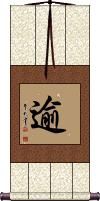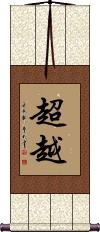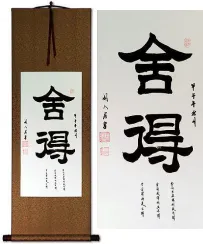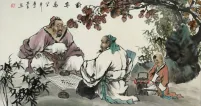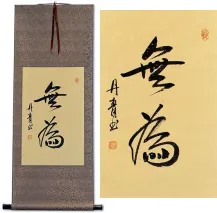Many custom options...
And formats...

Not what you want?
Try other similar-meaning words, fewer words, or just one word.
Go Beyond in Chinese / Japanese...
Buy a Go Beyond calligraphy wall scroll here!
Personalize your custom “Go Beyond” project by clicking the button next to your favorite “Go Beyond” title below...
Beyond / Exceed / Surpass
逾 means: to exceed; to go beyond; to transcend; to cross over; to jump over.
You'll see this character used in Buddhism (same meaning).
Technically, this single character is a Japanese word but is seldom used as a single Kanji in modern Japanese.
Overcome / Surpass / Rise Above
In Chinese, Japanese Kanji, and old Korean Hanja, 超越 means to overcome, surpass, transcendence, excel, exceed, go beyond, rise above, or transcend.
Once in a Lifetime
This Japanese title can be translated as “for this time only,” “chance meeting,” “one meeting, one opportunity,” “never again,” or “one chance in a lifetime.”
The characters literally mean “one time one meeting” - of course, the Kanji characters have meaning far beyond a direct translation like this.
Some might use this proverb to talk of an opportunity that presents itself just once in your life. It could also be a one-and-only chance meeting with your true soul mate. An expression of any event that might happen once in a lifetime.
This is primarily a Japanese title, however, there is also a Traditional Chinese (and old Korean) version of this proverb. Just the last character is different.![]() The traditional form was used in Japan before WWII and in Korea prior to 1900. This title is somewhat known in China.
The traditional form was used in Japan before WWII and in Korea prior to 1900. This title is somewhat known in China.
If you want the older traditional form, just click on the character to the right.
Tranquility Yields Transcendence
寧靜致遠 is an ancient Chinese idiom that means “tranquility yields transcendence.”
This suggests pursuing a quiet life of profound study.
The first two characters mean tranquility. The last two characters mean “go far,” which suggests achieving much in your life or expanding beyond normal limits. The direct translation would read something like, “[With] tranquility [in your life, you'll] go far.”
Compare this to the English idiom: Still waters run deep.
This in-stock artwork might be what you are looking for, and ships right away...
Gallery Price: $200.00
Your Price: $69.88
Gallery Price: $106.00
Your Price: $58.88
Gallery Price: $79.00
Your Price: $43.88
Not the results for go beyond that you were looking for?
Below are some entries from our dictionary that may match your go beyond search...
| Characters If shown, 2nd row is Simp. Chinese |
Pronunciation Romanization |
Simple Dictionary Definition |
逾 see styles |
yú yu2 yü yu |
More info & calligraphy: Beyond / Exceed / SurpassTo pass over, exceed. |
出 see styles |
chū chu1 ch`u chu de で |
to go out; to come out; to arise; to occur; to produce; to yield; to go beyond; to exceed; (used after a verb to indicate an outward direction or a positive result); classifier for dramas, plays, operas etc (n,n-suf) (1) coming out; going out; outflow; efflux; rising (of the Sun or the Moon); (n,n-suf) (2) attending (work); appearing (on stage); one's turn to go on; (n,n-suf) (3) start; beginning; (n,n-suf) (4) origins; background; person (or item) originating from ...; graduate of ...; native of ...; member of ... (lineage); (n,n-suf) (5) architectural member that projects outward; (n,n-suf) (6) highest point of the stern of a ship; (n,n-suf) (7) (kana only) (usu. after the -masu stem of a verb as 〜出がある or 〜出がない, etc.) amount (comprising something); amount of time or effort required to do something; (surname) De To go out, come forth, put forth; exit; beyond. |
不過 不过 see styles |
bù guò bu4 guo4 pu kuo fu ka |
only; merely; no more than; but; however; anyway (to get back to a previous topic); cannot be more (after adjectival) does not go beyond |
出乎 see styles |
chū hū chu1 hu1 ch`u hu chu hu |
due to; to stem from; to go beyond (also fig. beyond reason, expectations etc); to go against (expectations) |
出圈 see styles |
chū quān chu1 quan1 ch`u ch`üan chu chüan |
to gain popularity beyond the original niche community or fan base; to go mainstream |
出過 出过 see styles |
chū guō chu1 guo1 ch`u kuo chu kuo shutsuka |
to go beyond |
超過 超过 see styles |
chāo guò chao1 guo4 ch`ao kuo chao kuo chouka / choka ちょうか |
to surpass; to exceed; to outstrip (n,vs,vi) excess; surplus; exceeding (a limit, estimate, etc.); going over samatikram, to go beyond, cross over, transgress. |
越權 越权 see styles |
yuè quán yue4 quan2 yüeh ch`üan yüeh chüan |
to go beyond one's authority; arrogation |
越職 越职 see styles |
yuè zhí yue4 zhi2 yüeh chih |
to exceed one's authority; to go beyond the bounds of one's job |
跨界 see styles |
kuà jiè kua4 jie4 k`ua chieh kua chieh |
to go beyond the border; to be transboundary; (fig.) to transition to a new field of endeavor; to be interdisciplinary |
過ぐ see styles |
sugu すぐ |
(v2g-k,vi) (1) (archaism) (See 過ぎる・1) to pass through; to pass by; to go beyond; (v2g-k,vi) (2) (archaism) (See 過ぎる・2) to pass (of time); to elapse; (v2g-k,vi) (3) (archaism) (See 過ぎる・3) to have expired; to have ended; to be over; (v2g-k,vi) (4) (archaism) (See 過ぎる・4) to exceed; to surpass; to be above |
出世間 出世间 see styles |
chū shì jiān chu1 shi4 jian1 ch`u shih chien chu shih chien shusseken しゅっせけん |
monastic life To go out of the world; the world (or life) beyond this; the supra-mundane; the spiritual world. |
過ぎる see styles |
sugiru すぎる |
(v1,vi) (1) to pass through; to pass by; to go beyond; (v1,vi) (2) to pass (of time); to elapse; (v1,vi) (3) to have expired; to have ended; to be over; (v1,vi) (4) to exceed; to surpass; to be above; (v1,vi) (5) (as 〜に過ぎない, etc.) to be no more than ...; (v1,vi,suf) (6) (kana only) (often used after adj. stems or the -masu stems of verbs) to be excessive; to be too much; to be too ... |
はみ出す see styles |
hamidasu はみだす |
(v5s,vi) to protrude; to stick out; to hang out; to jut out; to bulge out; to overflow; to be forced out; to be crowded out; to be pushed out; to exceed; to go over; to go beyond |
勝過人法 胜过人法 see styles |
shèng guō rén fǎ sheng4 guo1 ren2 fa3 sheng kuo jen fa shōka ninpō |
to go beyond person and dharma(s) |
推陳佈新 推陈布新 see styles |
tuī chén bù xīn tui1 chen2 bu4 xin1 t`ui ch`en pu hsin tui chen pu hsin |
to push out the old and bring in the new (idiom); to innovate; to go beyond old ideas; advancing all the time |
無路可逃 无路可逃 see styles |
wú lù kě táo wu2 lu4 ke3 tao2 wu lu k`o t`ao wu lu ko tao |
no way out; nowhere to go; trapped beyond hope of rescue; painted into a corner |
超宗越格 see styles |
chāo zōng yuè gé chao1 zong1 yue4 ge2 ch`ao tsung yüeh ko chao tsung yüeh ko chōshū okkyaku |
transcend the tenets and go beyond the standards |
超過四句 超过四句 see styles |
chāo guō sì jù chao1 guo1 si4 ju4 ch`ao kuo ssu chü chao kuo ssu chü chōka shiku |
go beyond the four logical possibilities |
超過衆苦 超过众苦 see styles |
chāo guō zhòng kǔ chao1 guo1 zhong4 ku3 ch`ao kuo chung k`u chao kuo chung ku chōka shuku |
to go beyond myriad sufferings |
超過限度 超过限度 see styles |
chāo guò xiàn dù chao1 guo4 xian4 du4 ch`ao kuo hsien tu chao kuo hsien tu |
to exceed; to go beyond; to overstep the limit |
越俎代庖 see styles |
yuè zǔ dài páo yue4 zu3 dai4 pao2 yüeh tsu tai p`ao yüeh tsu tai pao |
lit. to go beyond the sacrificial altar and take over the kitchen (idiom); fig. to exceed one's place and meddle in other people's affairs; to take matters into one's own hands |
通りこす see styles |
toorikosu とおりこす |
(v5s,vi) to go past (a place or thing); to go beyond |
通り超す see styles |
toorikosu とおりこす |
(irregular kanji usage) (v5s,vi) to go past (a place or thing); to go beyond |
通り越す see styles |
toorikosu とおりこす |
(v5s,vi) to go past (a place or thing); to go beyond |
食み出す see styles |
hamidasu はみだす |
(v5s,vi) to protrude; to stick out; to hang out; to jut out; to bulge out; to overflow; to be forced out; to be crowded out; to be pushed out; to exceed; to go over; to go beyond |
限度を超える see styles |
gendookoeru げんどをこえる |
(exp,v1) to go beyond the limit; to pass the limit |
不敢越雷池一步 see styles |
bù gǎn yuè léi chí yī bù bu4 gan3 yue4 lei2 chi2 yi1 bu4 pu kan yüeh lei ch`ih i pu pu kan yüeh lei chih i pu |
dare not go one step beyond the prescribed limit |
Variations: |
hamideru はみでる |
(v1,vi) (1) (See 食み出す・1) to protrude; to stick out; to jut out; to hang out; to bulge out; (v1,vi) (2) (See 食み出す・2) to be forced out; to be pushed out; to be crowded out; (v1,vi) (3) (See 食み出す・3) to go over (e.g. a budget); to go beyond; to exceed |
理解の範疇を超える see styles |
rikainohanchuuokoeru / rikainohanchuokoeru りかいのはんちゅうをこえる |
(exp,v1) to go over one's head; to be beyond one's comprehension |
Click here for more go beyond results from our dictionary
The following table may be helpful for those studying Chinese or Japanese...
| Title | Characters | Romaji (Romanized Japanese) | Various forms of Romanized Chinese | |
| Beyond Exceed Surpass | 逾 | yu | yú / yu2 / yu | yü |
| Overcome Surpass Rise Above | 超越 | chou etsu / chouetsu / cho etsu | chāo yuè / chao1 yue4 / chao yue / chaoyue | ch`ao yüeh / chaoyüeh / chao yüeh |
| Once in a Lifetime | 一期一會 一期一会 | ichigo ichie ichigoichie | yī qī yī huì yi1 qi1 yi1 hui4 yi qi yi hui yiqiyihui | i ch`i i hui ichiihui i chi i hui |
| Tranquility Yields Transcendence | 寧靜致遠 宁静致远 | níng jìng zhì yuǎn ning2 jing4 zhi4 yuan3 ning jing zhi yuan ningjingzhiyuan | ning ching chih yüan ningchingchihyüan |
|
| In some entries above you will see that characters have different versions above and below a line. In these cases, the characters above the line are Traditional Chinese, while the ones below are Simplified Chinese. | ||||
Successful Chinese Character and Japanese Kanji calligraphy searches within the last few hours...
